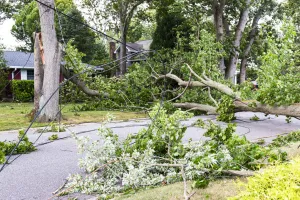 Summer storms can wreak havoc on your property, and as we approach hurricane season, you’ll want to know ahead of time what to do if a storm causes damage. ServiceMaster of Baltimore wants you to know how to prevent damage, minimize it if it occurs, and restore your property to even better than it was before the storm. Let us help you enjoy your space in safety and comfort.
Summer storms can wreak havoc on your property, and as we approach hurricane season, you’ll want to know ahead of time what to do if a storm causes damage. ServiceMaster of Baltimore wants you to know how to prevent damage, minimize it if it occurs, and restore your property to even better than it was before the storm. Let us help you enjoy your space in safety and comfort.
Storm Damage Prevention
Prevention is key to avoiding property damage as a result of summer storms and hurricanes.
- Check seals around windows and doors to ensure no water can leak through, even in high winds and heavy rain. Consider installing storm windows or doors if your property is particularly susceptible to leaks.
- Regularly inspect your roof for missing shingles, loose connections, or future problem spots. Also check interior ceilings and your attic to make sure there are no active leaks from previous weather damage.
- Clear your gutters and storm drains regularly. Clogged gutters are a common reason why homeowners experience erosion, as the gutters are unable to divert water away from the foundation when they are clogged. Make sure storm drains are clear so heavy rain can drain properly.
- Trim large shrubs or trees near your home so they do not fall on the roof, vehicles, or exterior buildings such as sheds. Even the sturdiest trees are susceptible to falling if the ground is saturated, as the root system becomes unstable when more water collects in the area.
What to Do After Storm Damage
There are several different ways your property can become damaged after a strong storm or hurricane. First, keep your safety in mind. If possible, wait until the storm has ended to assess the damage on your property. Next, take steps to minimize the damage as much as possible and document it for your insurance company if you will need to file a claim.
The most common type of damage after a storm is from the wind, which can rip shingles from your roof or knock down tree branches. It’s a good idea to check the gutters and drains after a big storm to make sure no large branches or clumps of leaves have blocked them.
Another common problem after storms is water damage, especially if you lost power. Monitor your basement or lowest level for flooding during the storm, and if it occurs, immediately take steps to reduce mold and mildew by removing as much of the water as possible. Flood water is considered “black water,” which can potentially contain viruses and bacteria that can make you sick. If you experience flooding after a storm, don’t wait to call a professional water damage restoration company.
Storm Damage Restoration in Baltimore
For over 60 years, ServiceMaster of Baltimore has helped homeowners and businesses get back on their feet after disaster strikes. Call us 24/7 at (410) 498-8030 to learn more about how we can help you restore your space after whatever Mother Nature throws your way.

